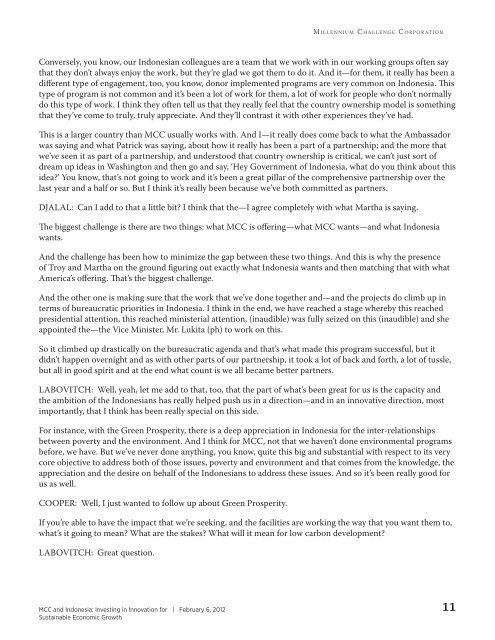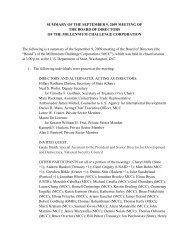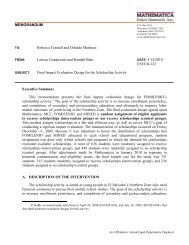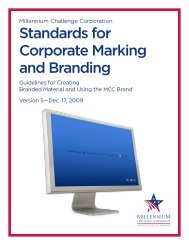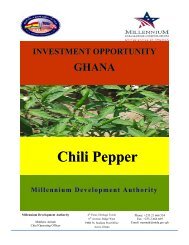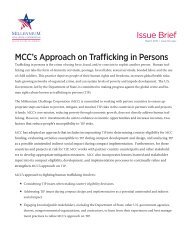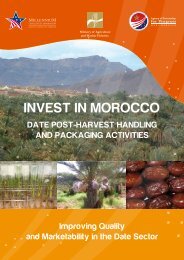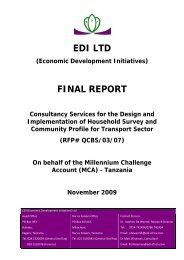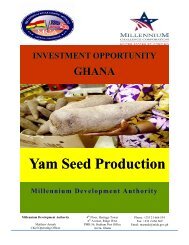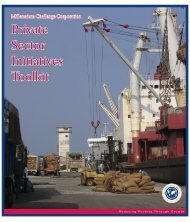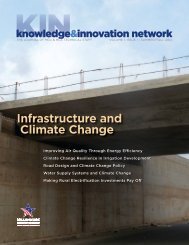Transcript - Millennium Challenge Corporation
Transcript - Millennium Challenge Corporation
Transcript - Millennium Challenge Corporation
Create successful ePaper yourself
Turn your PDF publications into a flip-book with our unique Google optimized e-Paper software.
Conversely, you know, our Indonesian colleagues are a team that we work with in our working groups often say<br />
that they don’t always enjoy the work, but they’re glad we got them to do it. And it—for them, it really has been a<br />
different type of engagement, too, you know, donor implemented programs are very common on Indonesia. This<br />
type of program is not common and it’s been a lot of work for them, a lot of work for people who don’t normally<br />
do this type of work. I think they often tell us that they really feel that the country ownership model is something<br />
that they’ve come to truly, truly appreciate. And they’ll contrast it with other experiences they’ve had.<br />
This is a larger country than MCC usually works with. And I—it really does come back to what the Ambassador<br />
was saying and what Patrick was saying, about how it really has been a part of a partnership; and the more that<br />
we’ve seen it as part of a partnership, and understood that country ownership is critical, we can’t just sort of<br />
dream up ideas in Washington and then go and say, ‘Hey Government of Indonesia, what do you think about this<br />
idea?’ You know, that’s not going to work and it’s been a great pillar of the comprehensive partnership over the<br />
last year and a half or so. But I think it’s really been because we’ve both committed as partners.<br />
DJALAL: Can I add to that a little bit? I think that the—I agree completely with what Martha is saying.<br />
The biggest challenge is there are two things: what MCC is offering—what MCC wants—and what Indonesia<br />
wants.<br />
And the challenge has been how to minimize the gap between these two things. And this is why the presence<br />
of Troy and Martha on the ground figuring out exactly what Indonesia wants and then matching that with what<br />
America’s offering. That’s the biggest challenge.<br />
And the other one is making sure that the work that we’ve done together and—and the projects do climb up in<br />
terms of bureaucratic priorities in Indonesia. I think in the end, we have reached a stage whereby this reached<br />
presidential attention, this reached ministerial attention, (inaudible) was fully seized on this (inaudible) and she<br />
appointed the—the Vice Minister, Mr. Lukita (ph) to work on this.<br />
So it climbed up drastically on the bureaucratic agenda and that’s what made this program successful, but it<br />
didn’t happen overnight and as with other parts of our partnership, it took a lot of back and forth, a lot of tussle,<br />
but all in good spirit and at the end what count is we all became better partners.<br />
LABOVITCH: Well, yeah, let me add to that, too, that the part of what’s been great for us is the capacity and<br />
the ambition of the Indonesians has really helped push us in a direction—and in an innovative direction, most<br />
importantly, that I think has been really special on this side.<br />
For instance, with the Green Prosperity, there is a deep appreciation in Indonesia for the inter-relationships<br />
between poverty and the environment. And I think for MCC, not that we haven’t done environmental programs<br />
before, we have. But we’ve never done anything, you know, quite this big and substantial with respect to its very<br />
core objective to address both of those issues, poverty and environment and that comes from the knowledge, the<br />
appreciation and the desire on behalf of the Indonesians to address these issues. And so it’s been really good for<br />
us as well.<br />
COOPER: Well, I just wanted to follow up about Green Prosperity.<br />
If you’re able to have the impact that we’re seeking, and the facilities are working the way that you want them to,<br />
what’s it going to mean? What are the stakes? What will it mean for low carbon development?<br />
LABOVITCH: Great question.<br />
MCC and Indonesia: Investing in Innovation for | February 6, 2012<br />
Sustainable Economic Growth<br />
11


